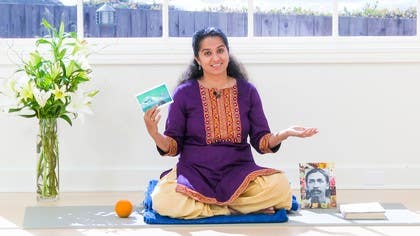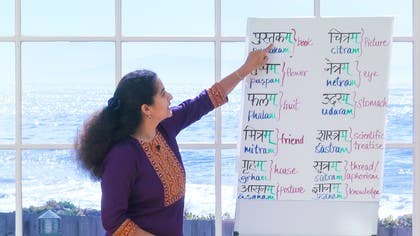Description
About This Video
Transcript
Read Full Transcript
Welcome back, hope you're enjoying exploring the different words in Sanskrit, the genders and also we've started seeing what these words look like. So we look at the words in the feminine now and I think this is a good opportunity also to see what the vowel a looks like in the word, alright, a and then e. So we have the first word which is necklace or garland, mala, there we are, mala, you should never make a mistake with the a after the series, so mala, right and that's the transliteration. The word for dish is sthaalika, so that's the half sthaa, li and then ka, sthaalika. In transliteration the same sthaalika.
The word for knife, chureka, chu, the short u, short e and the long a, chu rika, chu rika. Body part with an a, nasi ka, the nose, nasi ka, nasi ka, there we have it in transliteration as well, nasi ka, then the tongue, jihua, there you go, jihua, when we learnt the consonants combining with other consonants, we remembered that the her was like the pregnant mother that would take the letter within it. So you have the her and the verb sits inside it, alright, so jihua and in transliteration we have the same, chifua, the word for mother, amba, it's just one of the words but an important one that we can use on our shows. So we have amba, that's amba, then the word for ignorance, a vidya, that's what it looks like, a v, and you remember we had an exception with the the combining with the year, it underwent a complete transformation, so that's the transformation of the dia, so a vidya and that's the transliteration, a vidya. The transliteration is rather simple if you remember how to mark the long vowels and the specific position, so the palatals or the cerebrals.
Now moving on to the letters ending with an e, we had the word for a pen which was lekani and that's just the second part of it, so that's lekani, when we add the, or rather when we make it a colour pen, the word for colour being varna, it becomes varna lekani. I'll just draw your attention to a small detail there, we see that there is the consonant r which is half and you remember when we learnt about the exceptions with the r sound, when it comes before, it is written as a c, so in this letter which has a three point touch on the overhead line, the r will have to come on the last part of that letter, so varna lekani and the same in the transliteration. The word for pencil, ankani and there we have an example of the letter with a rounded bottom, remember it just shrinks and it incorporates the entire neighbour below it. So it gets ankani, got that, ankani. The word for bottle, kupi, both long vowels, kupi, represented with a long line over kupi.
An important word, the duravani, so duravani, duravani. Next we have the word, a body part, which has an e ending, the nadi and like you see I have not exactly written the translation because it's a tricky one. Sometimes it's translated as reverse within the body of energy, sometimes it's the channels. So I kept it open, I thought we'll discuss it before I included this so you understand. So it's the channel, the nadi is nadi, it's a cerebral one, alright, so it's nadi, the word in relations which is the sister, sahodari, sahodari and in the yoga world a female yogi is known as a yogini and that's how we have a yogini, yogini.
So do practice it and more the practice, the merrier in the yoga sutras as well as in the Gita in fact, they say that nothing can be achieved without practice because you don't have the possibility necessarily of people speaking the language. I would say for yourself, when you're using objects of daily life that you are a little familiar with now, try and see if these words can come to your active consciousness. So instead of saying give me the bottle, maybe you say give me the kupi or I'm taking the kupi for yourself, if you want to bring a little laughter in, say it aloud. Enjoy.
Mother Tongue: Building Our Vocabulary
Comments

You need to be a subscriber to post a comment.
Please Log In or Create an Account to start your free trial.








